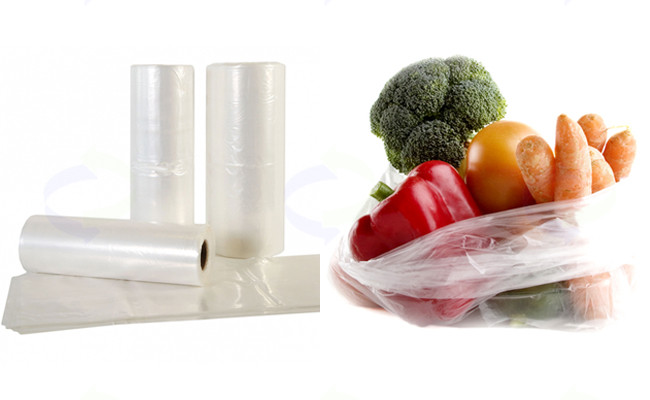By Colin Fernandez Environment Editor
Published: 10:50 EST, 28 September 2023 | Updated: 10:50 EST, 28 September 2023 Compostable Plastic Bag

Biodegradable plastic carrier bags are more toxic than conventional plastic bags, a new study has found.
Researchers analysed three types of bags – a compostable bag made of vegetable starch, a recycled plastic bag and a conventional plastic bag.
They exposed them to sunlight to make them break down, and then exposed them to fish cells.
They also then composted them and tested the resulting compost for toxicity.
A 'high level of toxicity' was produced by the biodegradable bags, harming the fish cells, according to the authors from the Spanish National Research Council (CSIC),
Researchers found a high level of toxicity in compostable plastic bags, which increases with photodegradation (the alteration of the plastic material by ultraviolet light)
Prior research warns compostable bags emit methane as they degrade in landfill
Cinta Porte, lead author of the study, published in the Journal of Hazardous Materials, said: 'We were surprised that cells exposed to conventional plastic bags showed no trace of toxicity.
'However, we did detect it in biodegradable ones, which decreased cell viability.
'Our hypothesis is that manufacturers add chemical additives to make biodegradable bags that could be particularly toxic.
'In addition, recycled plastic bags also showed higher levels of toxicity than conventional ones, as plastic additives would also be added for reuse.'
In the experiment, the aging process of the bags was simulated with ultraviolet rays (photodegradation).
The small fragments of bags remaining after composting and the compost resulting from the bag breaking down was analysed.
The study found that toxins 'which results in the accumulation of pollutants that can affect the environment and negatively impact the health of the population'.
Researchers analysed three types of bags: a compostable plastic bag made of vegetable starch, a recycled plastic bag and a conventional plastic bag. They exposed them to sunlight to make them break down, and then exposed them to fish cells
Pictured, compostable plastic that was used to package the Guardian newspaper that did not fully disintegrate in a compost bin
Amparo Lopez Rubio, co-author, said: 'The toxicity observed may derive both from the additives used during processing and from the fragments of biodegradable plastics produced during composting.'
'It is necessary to thoroughly investigate the migration and ecotoxicity of these new materials and establish a good regulatory framework, based on scientific evidence, to ensure their safety before they reach the market.
'We need an open and transparent interaction with the companies that will allow us to advance in the development of materials that, in addition to being more sustainable, are safe.'
The authors said the specific chemical compounds added to these compostable bags could not be identified in the study, as many additives are protected by patents.
But they are likely to be plasticisers – compounds added to the plastic to make it more flexible.
The researchers tested four different types of compostable bags - made from polybutylene adipate terapthalate and starch, a single use water bottle made of PET (polyethylene terapthalate) a conventional plastic bag made of LDPE (low density polyethylene) and two garbage bags made of recycled polyethylene.
Compostable bags tend to be advertised as 'eco-friendly' with slogans like 'save the planet' - but their green credentials may be overstated
Tiantian Wang, first author of the study said: 'Although each manufacturer may add different additives to their products, we have observed that all biodegradable bags have similar levels of toxicity.'
The researchers conclude: 'This work demonstrates the elevated toxicity of recycled plastics, compostable plastics, and semi-degraded compostable plastics resulting from partial disintegration, as compared to virgin conventional plastic extracts.
'These findings underscore the need for additional research efforts and the implementation of regulatory measures prior to the release of mature compost into the environment.'
Last year, researchers in Manchester reported that compostable bags have nearly twice the global warming impact of traditional plastic, and four times that of paper.
While compostable bags can only properly degrade under high temperatures in special processing plants, they're mostly discarded in general waste before being sent to landfill where they release methane, the experts said.
Of 30 billion plastic bottles used by UK households each year, only 57 per cent are currently recycled.
With half of these going to landfill, half of all plastic bottles that are recycled go to waste.
Around 700,000 plastic bottles a day end up as litter.
This is largely due to plastic wrapping around bottles that are non-recyclable.
Bottles are a major contributor to the increasing amount of plastic waste in the world's oceans.
Researchers warned eight million tonnes of plastics currently find their way into the ocean every year - the equivalent of one truckload every minute.
The amount of plastic rubbish in the world's oceans will outweigh fish by 2050 unless the world takes drastic action to further recycle, a report released in 2016 revealed.
At current rates, this will worsen to four truckloads per minute in 2050 and outstrip native life to become the largest mass inhabiting the oceans.
An overwhelming 95 per cent of plastic packaging - worth £65 - £92billion - is lost to the economy after a single use, the Ellen MacArthur Foundation report stated.
And available research estimates that there are more than 150 million tonnes of plastics in the ocean today.
Plastic pollution is ruining the ecosystems of the world, both marine and terrestrial. It litters shorelines, snags animals and suffocates entire populations of animals
So much plastic is dumped into the sea each year that it would fill five carrier bags for every foot of coastline on the planet, scientists have warned.
More than half of the plastic waste that flows into the oceans comes from just five countries: China, Indonesia, Philippines, Vietnam and Sri Lanka.
The only industrialized western country on the list of top 20 plastic polluters is the United States at No. 20.
The US and Europe are not mismanaging their collected waste, so the plastic trash coming from those countries is due to litter, researchers said.
While China is responsible for 2.4 million tons of plastic that makes its way into the ocean, nearly 28 percent of the world total, the United States contributes just 77,000 tons, which is less than one percent, according to the study published in the journal Science.
Furious mother of three-year-old girl found dead in a septic tank demands babysitter NIECE is jailed over death after prosecutors refused to press charges: 'She neglected my child and now she's gone'
Published by Associated Newspapers Ltd

Biodegradable Bag Part of the Daily Mail, The Mail on Sunday & Metro Media Group
